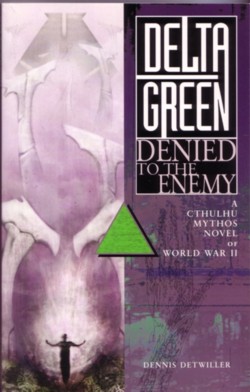Delta Green: Denied to the Enemy
Originally for Raw, New Things #14, 10/31/2004

This book is a tremendous disappointment. Dennis Detwiller has written some memorable stories in previous Delta Green anthologies, "Night and Water" in Dark Theatres, and "Drowning in Sand" from Alien Intelligence, in addition to being a major contributor to the whole Delta Green concept. I have come to believe that much of the brilliance of Pagan Publishing has come from the amazing editing skills of John Tynes. Pagan's publishing schedule may have been slow, but the quality of the writing has consistently been top-shelf. I believe this has primarily to do with the presence of John Tynes as an editor; scenarios in Pagan Publishing supplements are consistently excellent, and frequently better than the work by the same authors that appears in Chaosium's books. With Mr. Tynes' departure for greener pastures, the quality would seem to have suffered.
To the sensitive grammarian, Denied to the Enemy is a typographical horror. Detwiller should be able to distinguish between an n-dash and an m-dash. He should know that possessives have apostrophes. And even if he didn't, he should have had someone look over the manuscript who does.
The book is also, ultimately, a failure of vision. When one of the protagonists discovers that there are defectors from the Great Race of Yith, and that assassins are sent into the past to take care of them, he concludes that the Great Race isn't so different from humans after all. Well, what's the bloody point of that? Here was have a civilization to whom time means nothing, and that keeps records that will survive for millions of years, and they're basically a lot like us? What a disastrously prosaic concept. Where is the cosmic wonder which Lovecraft tried to hard to produce, or the concept that alien civilizations would actually be alien?
The only time the story really comes to life is when Detwiller is describing Delta Green agent Joseph Camp's expereinces as a guerilla in the jungles of Borneo. Here, in rather stark contrast to the rest of the novel, the details snap to life, and Camp unquestionably is the most fully realized character of the book. He has a history, and it is easy to see how his history has influences the decisions he makes in the book. Other characters simply do not have this level of comprehensibility; they lack the depth of history that Camp demonstrates.
Which is not to say his prose is bad. The text is readable, even if certain plot points are obscure. Anyone who can put together then sentence "Do not speak of this meeting to others or you may inadvertently destroy your species." has undeniably got talent. But half of writing a book is coming up with the good ideas. We've seen Detwiller provide these in the past, but the concepts in this story are thin and stretched. Possibly this is a result of the transition between forms; the short story is much easier to organize and create inspiration for than a full-length novel. I think that Mr. Detwiller, although a competent writer, wasn't quite ready for the novel form.